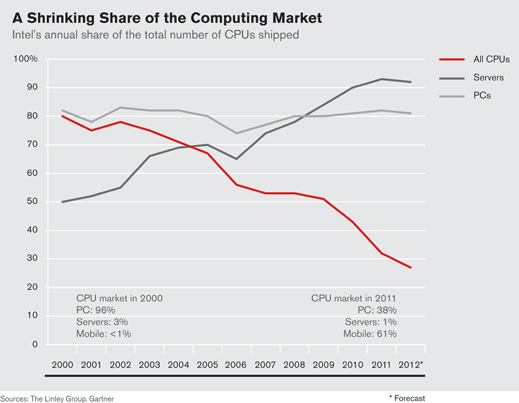The Pressure’s on for Intel
Since 2000, Intel has done just about everything right in its core business, maintaining its dominance of the market for PC microprocessors and putting substantial distance between itself and competitors in the market for server chips. And yet the company finds itself in a very tough position: computers are going mobile, and Intel’s share of the microprocessor market is falling off a cliff.

As shown in the chart above, 61 percent of all computing devices shipped in 2011 were of the mobile variety—up from less than 1 percent in 2000. Because most of those devices rely on technologies other than Intel’s, the company’s share of the total market for processors in computing devices has fallen from 80 percent to around 30 percent.
The company is finally entering the mobile game, but barely. The Linley Group forecasts that Intel will grab 0.7 percent of mobile processor shipments in 2012. So far it has gotten away with this meager showing because the mobile chip market as a whole remains relatively small—it is forecast to be around $5 billion in 2012, compared to $31 billion for PCs and nearly $10 billion for servers. But as the PC market slows and the popularity of smartphones and tablets continues to balloon globally, Intel will have to adapt or be left behind.
Keep Reading
Most Popular
Large language models can do jaw-dropping things. But nobody knows exactly why.
And that's a problem. Figuring it out is one of the biggest scientific puzzles of our time and a crucial step towards controlling more powerful future models.
How scientists traced a mysterious covid case back to six toilets
When wastewater surveillance turns into a hunt for a single infected individual, the ethics get tricky.
The problem with plug-in hybrids? Their drivers.
Plug-in hybrids are often sold as a transition to EVs, but new data from Europe shows we’re still underestimating the emissions they produce.
Stay connected
Get the latest updates from
MIT Technology Review
Discover special offers, top stories, upcoming events, and more.